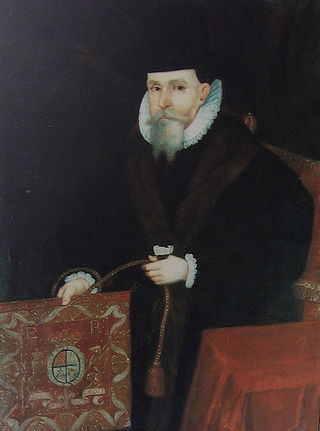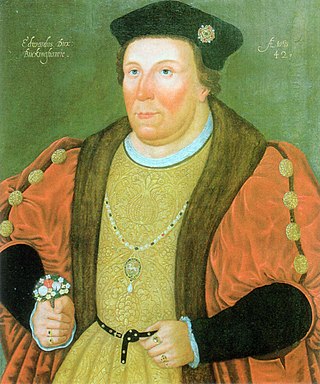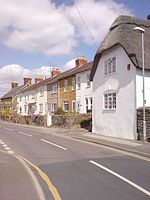
Adam Loftus was Archbishop of Armagh, and later Dublin, and Lord Chancellor of Ireland from 1581. He was also the first Provost of Trinity College Dublin.

Edward Stafford, 3rd Duke of Buckingham was an English nobleman. He was the son of Henry Stafford, 2nd Duke of Buckingham, and Katherine Woodville, and nephew of Elizabeth Woodville and King Edward IV. Thus, Edward Stafford was a first cousin once removed of King Henry VIII. He frequently attended the courts of Henry VII and Henry VIII. He was convicted of treason and executed on 17 May 1521.

Henry Stafford, 1st Earl of Wiltshire was an English peer.

Earl of Howth was a title in the Peerage of Ireland. It was created in 1767 for Thomas St Lawrence, 15th Baron Howth, who was elevated to Viscount St Lawrence at the same time, also in the Peerage of Ireland. The St Lawrence family descended from Christopher St Lawrence who was elevated to the Peerage of Ireland as Baron Howth in about 1425. The third and fourth Barons both served as Lord Chancellor of Ireland. The family's origins are thought to go back to Almeric Tristram, a liegeman of the Anglo-Irish knight John de Courcy, who conquered Howth in 1177. The St Lawrence family claimed significant prerogative rights as Lords of Howth over the whole peninsula, and were prepared to maintain their rights even against the English Crown.

Rowland FitzEustace, 1st Baron Portlester was an Irish peer, statesman and judge. He was one of the dominant political figures in late fifteenth-century Ireland, rivalled in influence probably only by his son-in-law Garret FitzGerald, the "Great" Earl of Kildare.

Stratton St Margaret is a civil parish in the Borough of Swindon, Wiltshire, England. The parish covers north-eastern suburbs of Swindon including Stratton St Margaret itself along with Upper Stratton, Lower Stratton and Kingsdown. Since May 2015, Nythe has been legally separated from Stratton St. Margaret and now forms its own parish council.

Sir Thomas Arundell of Wardour Castle in Wiltshire was a Cornish administrator and alleged conspirator.

John Talbot, 2nd Earl of Shrewsbury, 2nd Earl of Waterford, 8th Baron Talbot, KG was an English nobleman and soldier. He was the son of John Talbot, 1st Earl of Shrewsbury, 1st Earl of Waterford, 7th Baron Talbot, 10th Baron Strange of Blackmere, and Maud Neville, 6th Baroness Furnivall.

James Butler, 5th Earl of Ormond, Earl of Wiltshire was an Anglo-Irish nobleman and soldier. Butler was a staunch Lancastrian and supporter of Queen consort Margaret of Anjou during the Wars of the Roses. He was beheaded by the victorious Yorkists following the Battle of Towton.
The Recorder of Dublin was a judicial office holder in pre-Independence Ireland.

Thomas Grey, 2nd Marquess of Dorset was an English peer, courtier, soldier and landowner of the House of Grey.

Thomas Jones was Archbishop of Dublin and Lord Chancellor of Ireland. He was also Dean of St. Patrick's Cathedral and Bishop of Meath. He was the patrilineal ancestor of the Viscounts Ranelagh.
Adam de Stratton was a royal moneylender, administrator and clergyman under Edward I of England. He advanced professionally through the patronage of the earls of Devon, and became Chamberlain of the Exchequer and steward of Isabella, Countess of Devon. At the same time he made himself an enormous fortune through moneylending, primarily by acquiring debts from Jewish moneylenders. His business methods were dubious and often involved various illegal activities. In 1290 he fell victim to an investigation of corruption in the royal administration, and from 1292 until his death— no later than 1294—he was held in prison. Stratton has been called by a modern historian "the greatest and probably the most unscrupulous of thirteenth-century money lenders, who eventually met the fate he deserved."
Nicholas St Lawrence, 4th Baron Howth was a leading Irish nobleman, soldier and statesman of the early Tudor period, who held the office of Lord Chancellor of Ireland.

William I de Cantilupe 1st feudal baron of Eaton (Bray) in Bedfordshire, England, was an Anglo-Norman royal administrator who served as steward of the household to King John and as Baron of the Exchequer.
Luke (Lucas) Netterville was a sixteenth-century Irish judge. He was father of the statesman Richard Netterville and grandfather of the 1st Viscount Netterville.

Adam de Harvington, also called Adam de Herwynton (c.1270-c.1345) was a fourteenth-century Crown official and judge who had a successful career in both England and Ireland. He held office as Chief Baron of the Irish Exchequer and Lord Treasurer of Ireland, and as Chancellor of the Exchequer of England, and acquired considerable wealth.
William de Skipwith was a fourteenth-century English judge, who also served as a judge in Ireland. He held the office of Chief Baron of the Exchequer 1362-5. He suffered temporary disgrace when he was removed from office for corruption, but he was restored to favour, became Lord Chief Justice of Ireland 1370-2, and later returned to the English bench. He appears to have been the only High Court judge to have escaped impeachment by the English Parliament of 1388.
Arnold Boate, originally called de Boot (1606–1653) was a Dutch physician, writer and Hebraist who spent much of his life abroad, and lived for several years in Dublin. There he married Margaret Dongan, a judge's daughter, whom he portrayed lovingly in his book The Character of a Truly Virtuous and Pious Woman. He was the brother of Gerard Boate, author of The Natural History of Ireland, for which Arnold supplied much of the material. Both Gerard and Arnold were members of the Hartlib circle.
William Johnson (1760-1845) was an Irish politician, law officer and judge of the early nineteenth century. He sat in the Irish House of Commons, served as Serjeant-at-law (Ireland) and was a justice of the Court of Common Pleas (Ireland).
 Stratton St Margaret, Wiltshire, birthplace of Henry and his brother Adam
Stratton St Margaret, Wiltshire, birthplace of Henry and his brother Adam











